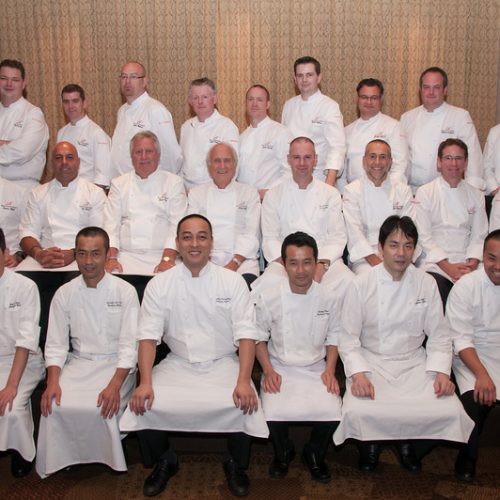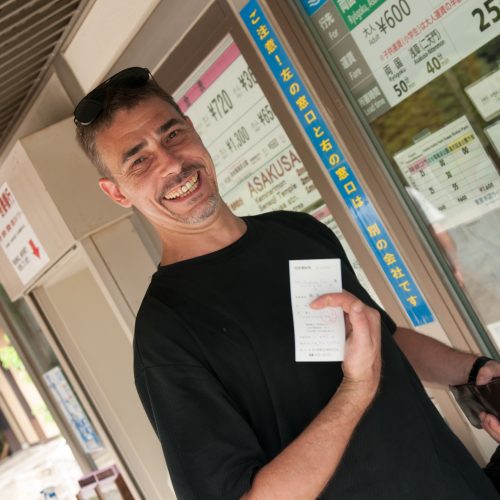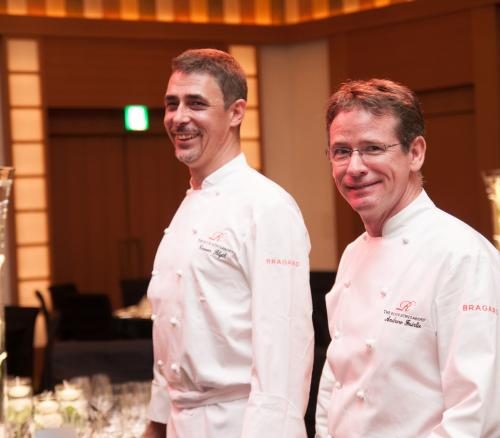1996
Trevor Blyth
“ I knew, if I was going to win, everything I cooked would have to be absolutely perfect – I was the most focused man in the world when I walked into the kitchen that day.”
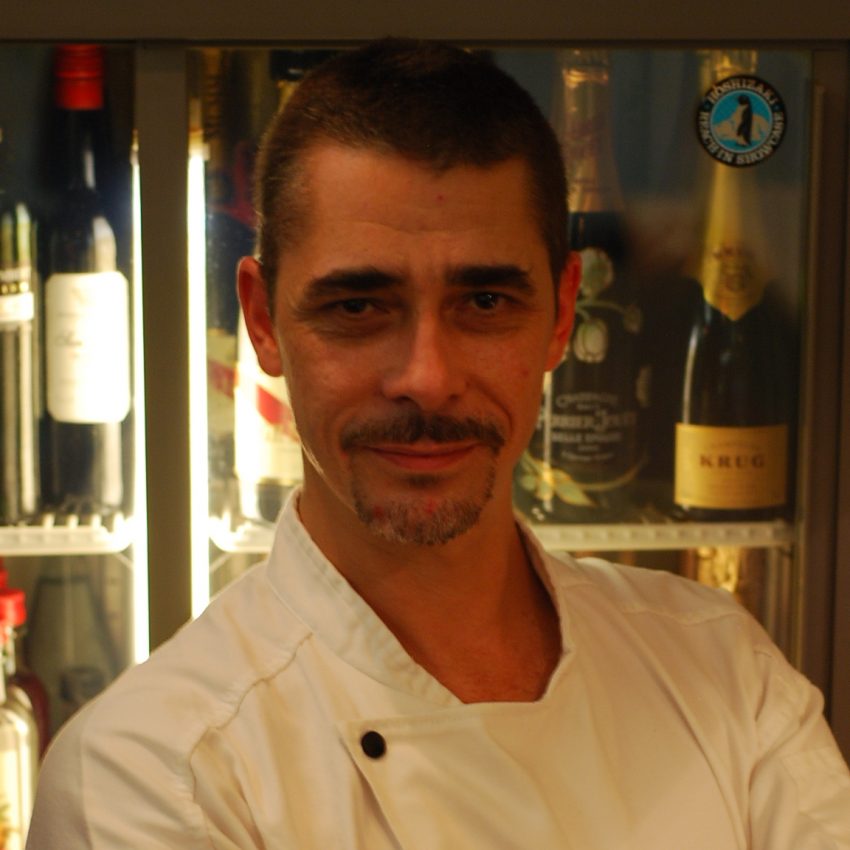
Trevor Blyth won the Roux Scholarship in 1996, at the age of 27. It was his 4th time entering the competition. He staged at La Côte Saint-Jacques in Joigny, Burgundy and is now chef and owner of Cook Toyko in Japan.
Trevor grew up in Norfolk and first decided he wanted to be a chef at the age of 15 after taking a part-time washing-up and cleaning job at a local bakery, while still at school. He went on to train at Norwich City College Hotel School and began his career at Hintlesham Hall in Suffolk, where the then-head chef Robert Mabey (National Chef of the Year 1984), who had travelled to Japan, was the first to introduce Trevor to some Japanese flavours and ideas, such as tempura.
From there, Trevor went on to work as chef de partie at Rules in Covent Garden and then Waldo’s restaurant at Cliveden House, Berkshire. In 1993, he went to work in France for Michel Guérard at his three-Michelin-starred restaurant, Les Prés d'Eugénie in Eugénie-les-Bains. His application had been warmly received thanks to the scholarship’s first winner Andrew Fairlie, who had staged there in 1984, for paving the way for British chefs working in France. There, he worked with a number of French chefs who remembered Andrew, as well as other chefs from all over the world. Among them were five stagiaires from Japan, two of who have become Trevor’s life-long friends. When he returned to London, the following year he took a position at Le Gavroche working under Michel Roux Jr.
A year later Trevor was appointed to his first head chef position at Girauds Restaurant in Burnham Buckinghamshire and, in 1996, Trevor won the Roux Scholarship, which he maintains was the award that had a greater bearing on his development as a chef than any other single event in his entire career history. During his stage with Jean-Michel Lorain at La Côte Saint-Jacques in Joigny, Burgundy, Trevor was able to build on his knowledge of French cuisine learned from Michel Guerard and Michel Roux Jr.
On returning from France, Trevor became head chef at Mallory Court Hotel in Leamington Spa, Warwickshire. Two years later he took over the running of the kitchen at the newly opened Pelham Street restaurant in South Kensington, London, which was nominated for best newcomer and best modern British restaurant in the 1999 Evening Standard Carlton food awards.
Trevor left for Japan in November 2000 and worked at the 40-seat Barakura English Garden restaurant in Nagano prefecture where he published his first book with NHK (the national broadcaster) about his cooking style in Japan. Three years later he met Hiromi, his wife-to-be and moved to Tokyo, taking over as Executive chef at the French-Asian fusion restaurant, Kayumanis, in the Ginza district. In 2006, Trevor and Hiromi decided to open their own restaurant, The White Fox, named after the mythical, magical, mischievous, spirit foxes, messengers of Inari, the Japanese God of rice and food. This enabled Trevor to combine all that he had learnt about Japanese cuisine with his knowledge of French cuisine to create a unique and individual modern style of his own. In 2007 Trevor was awarded first prize in the Eat-Japan International Original Sushi Competition and The White Fox was listed in the top 5 contemporary restaurants in Japan, every year from 2009 to 2015 in the Asia-wide Miele Guide.
They launched their online e-commerce business Cook Tokyo in 2014. The Cook Tokyo website provides detailed information about Japan’s unique cooking products and English language access to the highest grade traditional Japanese ingredients which are otherwise not available to chefs and restaurants outside Japan.
In August 2016, after ten years of successful trading at The White Fox, Trevor decided not to renew the buildings rental contract in Oji as he wanted to further develop his cuisine concept at a larger Central Tokyo location.
Since September 2021, Trevor has been working as Head Chef at a small restaurant in central Tokyo called Rangitoto. It is owned and run by Wayne and Makie Shennan, one of New Zealand's foremost sommeliers and his Japanese wife. Wayne is one of only three non-Japanese people worldwide to have attained the highest rank as a sake master, and Rangitoto specialises in New Zealand wines and Japanese sake and serves a modern style of creative cooking mixing Japanese/French cuisines.
Trevor has written several articles about cooking in Japan for various international food and travel publications and also appeared several times as guest chef on the NHK World, Delicious Japan programme. He has also cooked at special events for all of the past three Ambassadors to Japan at the British Embassy, Tokyo. In 2012 he and Hiromi arranged a gastronomic tour of Japan for Michel Roux and 16 former winners of the Roux Scholarship competition. And in 2017 Trevor arranged the stage for that year's winner of the Roux Scholarship Luke Selby with Seiji Yamamoto at Nihonryori Ryugin, Tokyo.
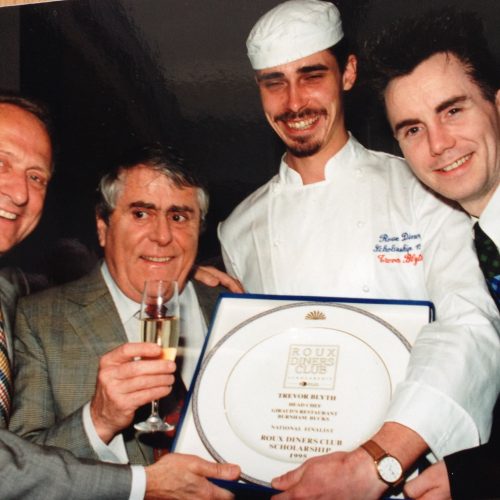
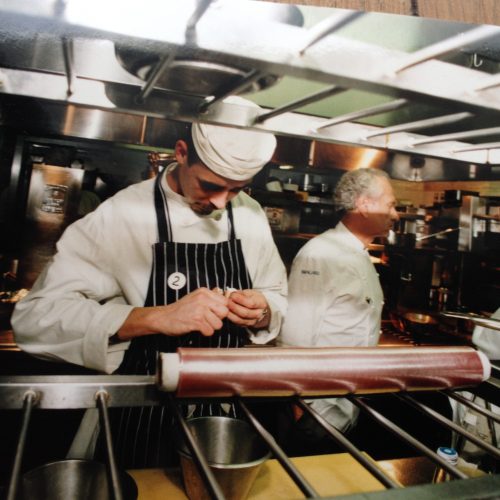
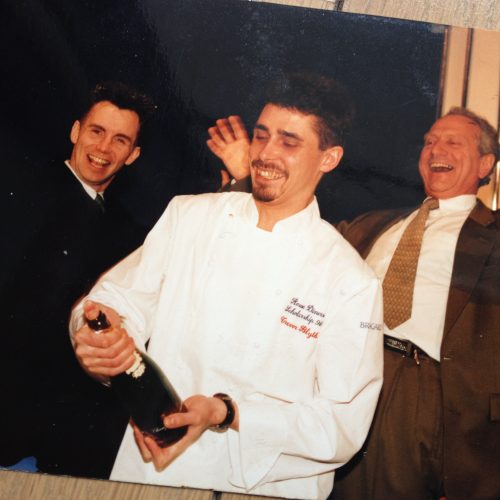
Where did you do your stage?
La Cote Saint Jacques was a great experience and Jean-Michel Lorain ensured that I spent time on each section over the three months I was there. I also joined the sous chefs on several of the once weekly overnight buying trips to Rungis market.
What did you cook in the final?
Lobster Newberg – the sauce Newberg makes this dish. It is delicious and quite simple to make but easy to mess up – the lobster should be only ‘just’ cooked (of cause) and likewise the shells should be only ‘just’ roasted.
How many times did you enter?
Four times… the first time I got through to the final but I messed up big time by under-cooking my main ingredient (whole roast duck)… nerves!! Second time I did not pass the regional finals. For the next two years I did not enter because one year I was working in France at Les Pres d’Eugenie and the following year at Le Gavroche (and chefs working for Roux Restaurants are not permitted to enter). The third time I was awarded second place in the finals behind Chris Colmer and fourth time I finally won.
What do you remember most about the competition the year you won?
The year I won I remember being very aware that there were a couple of really strong chefs in the final, Freddy Foster who would go on to win four years later and Robert Clayton who had just been awarded his first Michelin star earlier that year. I knew, if I was going to win, everything I cooked would have to be absolutely perfect – I was the most focused man in the world when I walked into the kitchen that day – at the presentation when Michel announced my name I felt a strange combination of extreme happiness and extreme relief in equal measure. Euphoric!
What advice would you give applicants?
The Roux Scholarship is unique amongst cooking competitions. As a competitor you are encouraged to be creative and innovative in designing and cooking your own dish for the semi-finals. For those who progress to the final, your classical knowledge is then tested. The winner is given an invaluable opportunity to train in a Three Michelin star restaurant of their choice and also becomes a member of the Roux Scholars club. Once you win the Roux Scholarship you are a Roux Scholar for life and I would highly recommend all young chefs enter and keep re-entering until they win.
Who are your culinary heroes?
The whole Roux family have been an inspiration and significant influence throughout my entire career. I first met Michel during my time at Cliveden. He would allow me to come and work a week or two stage at the Waterside Inn whenever I had overdue holiday time to use up from Cliveden. It was during one of these stages that I met Alain, who had just joined The Waterside's kitchen. We are almost the same age and over the years I have come to greatly value his good solid friendship. My time at Le Gavroche working was under Michel Jr was an invaluable experience and I have a great admiration for the professional workman like way he runs his kitchen. I have sought the advice of Michel and Albert throughout my career about various job changes and the opening of my restaurants. Also, Michel’s wife Robyn would always give a supportive word and have time for a chat and a laugh whenever I saw her. Most of all I admire Michel for beginning the Scholarship in the first place and having the vision to persevere and grow it into the internationally recognised competition that it has become. And long before I met any of them the first cookbook I ever bought, when I was still at college, was Roux Patisserie and I still use some of those recipes today.
What is it like to be a Roux Scholar?
Made up of all the past winners, the scholars' club sets the Roux Scholarship aside from all other cooking competitions worldwide. It is a unique network encouraging and enabling like-minded professional chefs to exchange news, views and ideas and join culinary trips around the globe, which are enjoyed not only for the educational content but also for the humour, banter and camaraderie of the scholars
